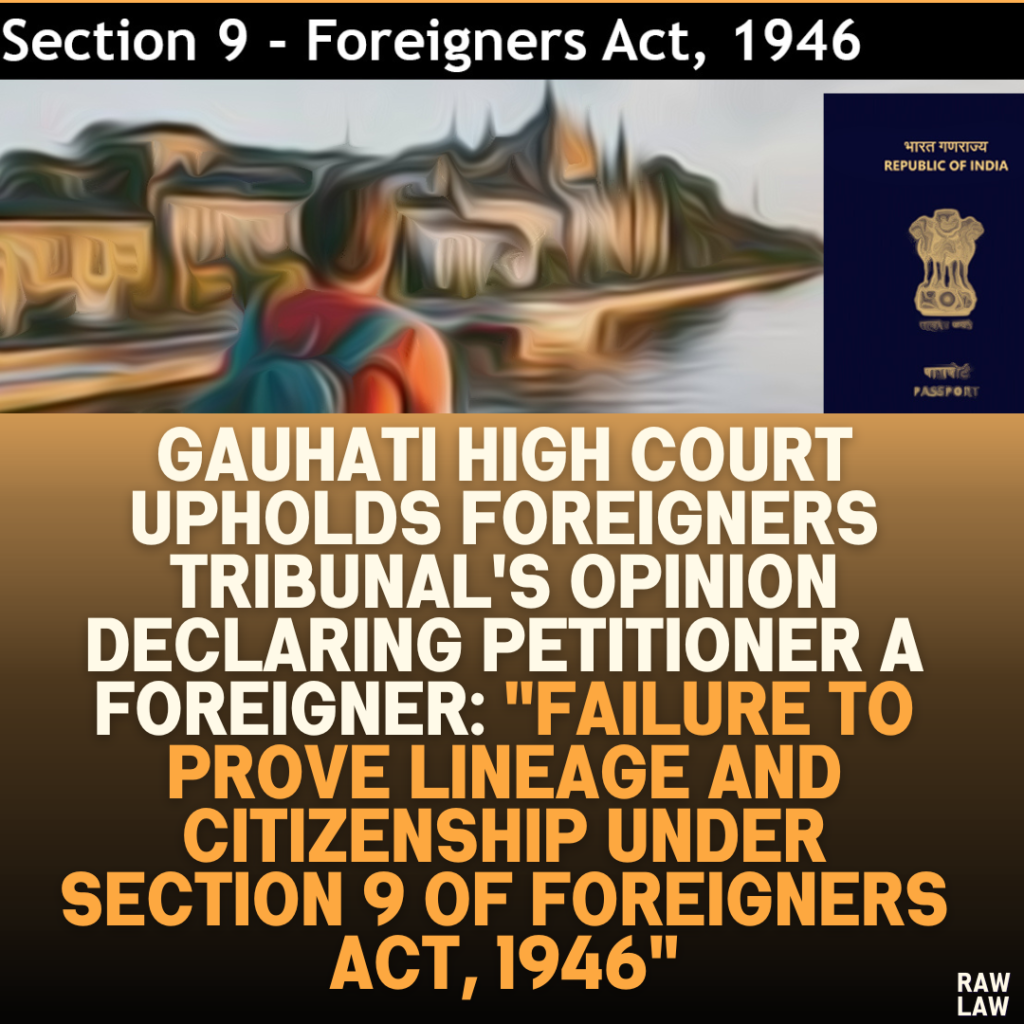Court’s Decision
The Gauhati High Court dismissed a writ petition challenging the Foreigners Tribunal’s opinion, which declared the petitioner a foreigner who entered India on or after March 25, 1971. The court upheld the tribunal’s findings, stating the petitioner had failed to discharge the burden of proof as mandated under Section 9 of the Foreigners Act, 1946. The court ruled that the evidence presented was insufficient to establish the petitioner’s Indian citizenship.
Facts
- The petitioner was marked as a “doubtful voter” (D-voter) in the Assam voter list, leading to an inquiry into her citizenship.
- Based on the inquiry, the matter was referred to the Foreigners Tribunal under the Foreigners Act, 1946, to ascertain whether the petitioner was an Indian citizen or a foreigner.
- Before the tribunal, the petitioner submitted several documents to establish her lineage and citizenship, including:
- Voter lists from 1977, 1997, 2011, and 2013.
- A linkage certificate issued by the Bagribari Revenue Circle Officer.
- A voter ID card.
- Despite the evidence, the tribunal concluded that the petitioner failed to establish her linkage to her alleged Indian parents or grandparents and declared her a foreigner.
- Aggrieved by the tribunal’s decision, the petitioner filed a writ petition in the High Court seeking to quash the tribunal’s opinion.
Issues
- Whether the petitioner successfully discharged the burden of proof to establish her citizenship under Section 9 of the Foreigners Act, 1946.
- Whether the documents submitted, including voter lists and the linkage certificate, were sufficient to prove her claim of Indian citizenship.
Petitioner’s Arguments
- Evidence of Citizenship: The petitioner argued that her name appeared in multiple voter lists (1977, 1997, and others), indicating her Indian citizenship.
- Linkage Certificate: She relied on a certificate issued by the Revenue Circle Officer, which purportedly confirmed her relationship with her Indian father and grandfather.
- Marriage and Residency: The petitioner claimed that she was born and raised in Khoraghat village and later moved to Falakata Pt-I after her marriage, which was supported by voter records and her voter ID card.
Respondent’s Arguments
- Burden of Proof: The respondents asserted that the burden of proving citizenship rests solely on the petitioner under Section 9 of the Foreigners Act, 1946.
- Insufficient Evidence: They contended that the documents submitted by the petitioner were insufficient and inadmissible as they failed to establish her lineage to Indian ancestors.
- Legal Precedents: The respondents argued that legal precedents disqualify documents like NRC drafts and voter ID cards as definitive proof of citizenship.
Analysis of the Law
- Burden of Proof (Section 9 of the Foreigners Act, 1946):
- The law mandates that individuals suspected of being foreigners must prove their citizenship. The tribunal and the court emphasized this principle throughout their decisions.
- Insufficiency of Documents:
- Documents such as voter lists and certificates are insufficient unless they are proven both in authenticity (genuine creation) and content (accurately reflecting facts). The petitioner failed to meet this dual requirement.
- Precedents Considered:
- Sarbananda Sonowal v. Union of India (2005): Affirmed that the burden of proof lies entirely on the proceedee.
- State of Assam v. Moslem Mondal (2013): Emphasized that mere submission of documents is inadequate unless their admissibility and relevance are established through supporting evidence.
- Rupajan Begum v. Union of India (2018): Highlighted the dual test for certificates—authenticity and verification of content.
Precedent Analysis
- Linkage Certificates:
- In Rupajan Begum (2018), the Supreme Court held that certificates issued by local authorities must be verified for authenticity and content. This case applied similar reasoning to reject the petitioner’s linkage certificate.
- Voter Lists:
- The court noted that voter lists alone are insufficient proof of citizenship unless supported by credible evidence linking the petitioner to Indian ancestors.
- Writ Jurisdiction (Article 226):
- Referencing Central Council for Research in Ayurvedic Sciences v. Bikartan Das (2023), the court clarified that writ jurisdiction under Article 226 cannot be used to reweigh evidence or substitute its opinion for that of a tribunal unless there is a manifest error of law.
Court’s Reasoning
- Failure to Establish Linkage:
- The petitioner relied heavily on voter lists and a linkage certificate to claim ancestry. However, no credible witness or additional evidence was provided to corroborate her claims.
- No Supporting Relatives or Witnesses:
- The petitioner failed to produce relatives or siblings to confirm her relationship with the alleged Indian ancestors.
- Admissibility Issues:
- The linkage certificate, although issued by a local officer, was not supported by contemporaneous records or verified registers to prove its authenticity and content.
- NRC as Insufficient Proof:
- The court reiterated earlier rulings that NRC entries do not constitute proof of citizenship.
Conclusion
The High Court dismissed the writ petition, upholding the Foreigners Tribunal’s opinion. The court emphasized that the petitioner failed to satisfy the burden of proof required under Section 9 of the Foreigners Act, 1946, and found no grounds to interfere with the tribunal’s decision under its writ jurisdiction.
Implications
- Stringent Proof Requirements:
- The judgment reinforces the principle that individuals must provide conclusive and admissible evidence to establish their citizenship.
- Judicial Review under Article 226:
- It underscores the limited scope of judicial review in writ petitions challenging tribunal decisions, with courts intervening only in cases of jurisdictional error or manifest illegality.
- Impact on Citizenship Disputes:
- This decision adds to the jurisprudence on citizenship verification in Assam, highlighting the challenges faced by individuals in proving lineage to Indian ancestors under strict evidentiary standards.
